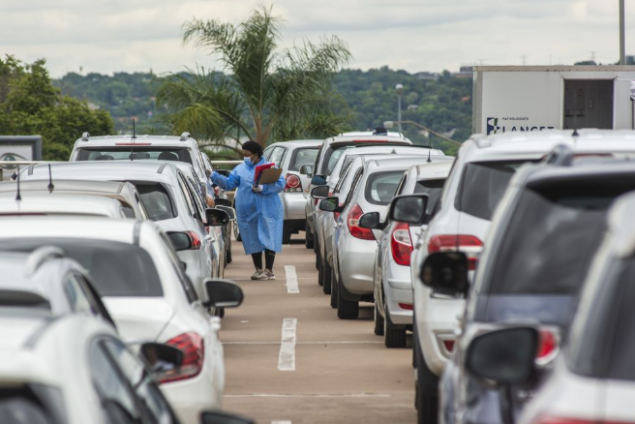A study by South African scientists into the new coronavirus variant driving a resurgence of cases in the country raises concern about the efficacy of vaccines and a new class of therapies.
Half the blood samples taken from a small group of people to have recovered from Covid-19 didn’t have the antibodies needed to protect against the 501Y.V2 strain identified last month, according to the paper by South Africa’s National Institute for Communicable Diseases.
In the other half, antibody levels were reduced and the risk of re-infection couldn’t be determined, according to the institute.
New strains of the virus have also been identified in countries including the U.K. and Brazil, leading to concerns that increasingly dangerous versions of the pathogen still yet to emerge may hamper the global rollout of vaccines.
The lineage recently identified in Brazil “also has changes at key positions” shown in this study to “affect neutralizing antibodies,” the scientists said. “Our data suggest that this lineage is also likely to exhibit significant levels of neutralization resistance, making both lineages of considerable public health concern.”
The NICD findings may “foreshadow reduced efficacy of current spike-based vaccines,” the scientists said.
They also suggest that treatment with plasma from donors who’ve had the coronavirus may not be successful in those with this variant.
The findings weren’t peer-reviewed and were based on samples of 44 donors.
“These data highlight the need for increased, ongoing surveillance and sequencing during the SARS-CoV-2 pandemic,” the authors including Penny Moore, a professor at the NICD, said.
The strain that emerged in South Africa is about 50% more transmissible than earlier versions, Salim Abdool Karim, co-chair of the Covid-19 ministerial advisory committee, said in a presentation earlier this week. However, there’s no evidence it’s more likely to cause hospitalization or death, he said.
Why the Mutated Coronavirus Variants Are So Worrisome: QuickTake
A separate study by Pfizer Inc. and BioNTech SE showed that their Covid-19 vaccine will protect against the new variant of the coronavirus that emerged in the U.K. Scientists have previously said many existing vaccines could be adapted to new strains if needed.
— With assistance by Naomi Kresge
Latest Stories
-
Resignation is a personal choice, not a necessity – Spio-Garbrah on Chief Justice suspension
9 minutes -
Joy FM’s 6th Showbiz Roundtable to highlight mental health of creatives
12 minutes -
Minister assures investors of regulatory stability in energy sector as offshore drilling resumes
13 minutes -
Deputy Minority Leader demands clarity on privately financed presidential and vice presidential travels
15 minutes -
Prof Baffour Agyeman-Duah: Protecting our independent governance institutions
22 minutes -
Ashok Mohinani honoured with CEO Excellence Award in the Poly Product-Tank Sector
23 minutes -
Ghanaian teacher wins 2025 global Cambridge Dedicated Teacher Award
25 minutes -
Ayariga commends Foreign Affairs Minister for swift action on Washington Embassy incident
28 minutes -
Occupants of Church built on Lashibi Ramsar site given 1-week to pack out before demolition
37 minutes -
Mpox concerns heighten as Ashanti Region tests 10 suspected cases
39 minutes -
Ghanaian students to access education, jobs in Germany through new university partnership
43 minutes -
UNFPA embarks on free obstetric fistula surgeries for underprivileged women in five major hospitals
47 minutes -
Chinese and Malaysian nationals arrested over suspected cyber-crime activities in Weija
49 minutes -
Useless Column: Ghana to spoil Nigeria’s jollof?
53 minutes -
Thomas Partey nominated for Best West African Player Abroad at 2025 CIS Awards
1 hour

